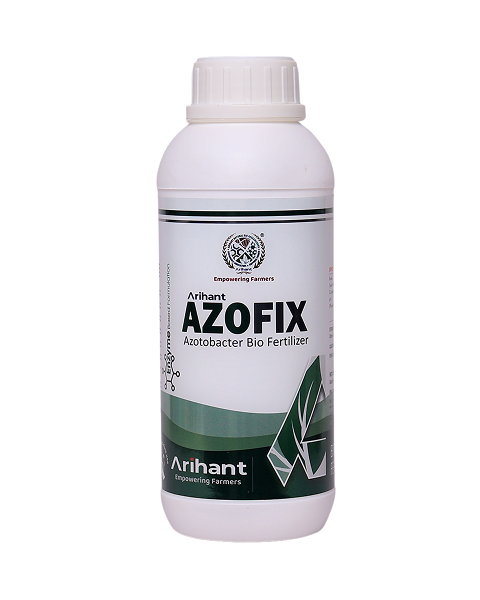- घर
- कॉर्पोरेट साइट
- बिगहाट पर बेचें
- थोक ऑर्डर संबंधी पूछताछ
-
ब्रांडों
माहिको सेमिनिस नामधारी यूपीएल रिज़क ज़वान सिंजेन्टा अमेरिकी कृषि ज्ञात-आप नुन्हेम्स (बायर्स) मैं और बी बीज TAKII इंडो अमेरिकन ड्यूपॉन्ट पायनियर मोनसेंटो डेकालब तनिंदोपूरब पश्चिम NUZIVEEDU बायोसीड रासी FITO एचएम खंड ऊर्जा अशोक पहुजा वीएनआर सकटा पीएचएस सनग्रो यूनीवेग टोकिता पान के बीजडॉव कृषि विज्ञान यूपीएल टाटा रैलिस धनुका एडामा बायर पीसीआई बैरिक्स इंडोफ़िल हैदराबाद रसायन पीआई उद्योग रिनुजा
- बीज
- फसल सुरक्षा
- फसल पोषण
- मशीनरी
- पशुपालन
- खंडों
- बिगहाट सेवाएँ
- ज्ञान
आपकी गाड़ी वर्तमान में खाली है।
सबसे ज़्यादा खोजा गया
- Description
About Product
- Azotobacter is a genus of free-living, nitrogen-fixing bacteria that plays a vital role in the nitrogen cycle.
- These bacteria are found in various soil environments and can thrive in both aerobic (oxygen-rich) and anaerobic (oxygen-depleted) conditions.
- They possess the unique ability to convert atmospheric nitrogen into a form usable by plants, thereby reducing the dependency on synthetic nitrogen fertilizers.
- Azotobacter also promotes plant growth through the production of growth-promoting substances, enhancing nutrient availability and root development.
Technical Content
- AZOTOBACTER CFU minimum 1 x 10 ^ 8 cell/ml.
Features
- Nitrogen fixation: Azotobacter has the unique ability to convert atmospheric nitrogen into ammonia, a form usable by plants. This process, known as nitrogen fixation, helps reduce the need for synthetic nitrogen fertilizers and promotes sustainable crop production.
- Growth promotion: Azotobacter produces growth-promoting substances like auxins, cytokinins, and gibberellins, which stimulate plant growth and development. This leads to enhanced root growth, nutrient uptake, and overall plant vigor.
- Improved nutrient availability: These bacteria secrete enzymes that break down organic matter, releasing nutrients such as phosphorus, potassium, and micronutrients into the soil. This process improves nutrient availability for plants and supports healthy root development.
- Enhances soil fertility: Azotobacter contributes to soil fertility by increasing organic matter content, improving soil structure, and enhancing cation exchange capacity. It helps create a favorable environment for beneficial soil microorganisms and supports the overall health of the soil ecosystem.
- Strengthened plant resistance: Azotobacter can stimulate the production of certain compounds in plants that enhance their defense mechanisms against pathogens and pests. This can lead to improved disease resistance and reduced reliance on chemical pesticides.
- Environmental sustainability: By reducing the need for synthetic nitrogen fertilizers, Azotobacter biofertilizers help minimize the negative impacts of nitrogen runoff into water bodies. This mitigates pollution and improves environmental sustainability in agricultural practices.It thrives even in alkaline soils.
- Biological Control Agent: Azotobacter produces substances that inhibit plant pathogens, thus acting as a biological control agent.
Dosage
- 1 LITRE PER ACRE.
Method Of Application
- SEED TREATMENT , ROOT DIPPING , FOLIAR SPRAY , SOIL APPLICATION , DRIP IRRIGATION.
Crops
- Crop Suitability - Grapes & Banana, Citrus, Mango, Tomato, Pomegranate, Groundnut, Cotton, Soyabean, Coconut, Potato, Brinjal, Onion, Garlic, Cumin, Chillies, Beans, Okra, Pea, Tomato, Cabbage, Cauliflower, Sugarcane, Paddy, Rice, Wheat, Sorghum, Bajra, Lawns, Gardens, Green House,
Additional Information
- Additionally, they contribute to soil fertility by producing enzymes that degrade organic matter, releasing nutrients for plants.
- As a natural biofertilizer, Azotobacter offers sustainable and eco-friendly solutions for agriculture, improving soil health and crop productivity.
- Azotobacter can accomplish nitrogen fixation by using three different enzymes, which are termed nitrogenases. The enhanced versatility of Azotobacter bacteria makes the microbe attractive for agricultural purposes.
कार्ट में जोड़ें




















